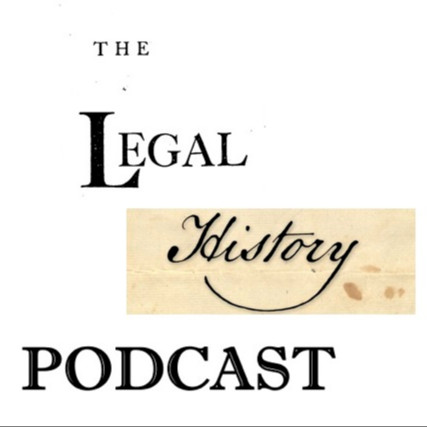Episodes

Wednesday Jun 18, 2025
EPISODE 39: Chloe Kennedy
Wednesday Jun 18, 2025
Wednesday Jun 18, 2025
In this episode, Catherine Evans talks with Chloe Kennedy about Kennedy's book "Inducing Intimacy: Deception, Consent and the Law" (Cambridge University Press, 2024).
Chloe Kennedy is Professor of Law and History at The University of Edinburgh Law School where she focuses on intellectual and cultural legal history. More particularly, she studies the ways prevailing ideas have shaped the law's development and continue to inform our contemporary assumptions.
Guest host Catherine Evans is Associate Professor of Criminology & Sociolegal Studies at the University of Toronto where her research focuses on the history of criminal law in the British empire.

Friday Mar 21, 2025
EPISODE 38: Gijs Kruijtzer
Friday Mar 21, 2025
Friday Mar 21, 2025
In this episode, Siobhan talks with Gijs Kruijtzer about his book "Justifying Transgression: Muslims, Christians, and the Law - 1200 to 1700" (De Gruyter, 2023)
Since obtaining a PhD from Leiden University, Gijs Kruijtzer has held postdocs at Yale University, Humboldt University, and the University of Vienna, and worked as a lecturer and archivist. Starting from a background in the history of South Asia and the Muslim world, as well as Europe, he researches universal questions about the experience of identity and how people deal with inconvenient rules/laws.
You can view a Zoom AI generated transcript here: https://docs.google.com/document/d/176QT6gRZivBWdXH1SeecUGlXbOaysC2ZM5b6AtdONQM/edit?usp=sharing

Tuesday Nov 19, 2024
EPISODE 37: Hendrik "Dirk" Hartog
Tuesday Nov 19, 2024
Tuesday Nov 19, 2024
In this episode, Siobhan talks with Hendrik Hartog about his book "Nobody’s Boy and His Pals: The Story of Jack Robbins and the Boys’ Brotherhood Republic” (The University of Chicago Press, 2024).
Hendrik "Dirk" Hartog is the Class of 1921 Bicentennial Professor in the History of American Law and Liberty, Emeritus at Princeton University. For a decade, he was the director of Princeton University’s Program in American Studies. Hartog has spent his scholarly life obsessed with the difficulties and opportunities that come with studying how broad political and cultural themes have been expressed in everyday legal conflicts. He has worked in a variety of areas of American legal history: on the history of city life, on the history of constitutional rights claims, on the history of marriage, on the history of slavery and emancipation, and on the historiography of legal change and of legal history.

Monday Oct 07, 2024
EPISODE 36: Dylan C. Penningroth
Monday Oct 07, 2024
Monday Oct 07, 2024
In this episode Siobhan talks with Dylan C. Penningroth about his prize-winning book “Before the Movement: The Hidden History of Black Civil Rights” (Liveright, 2023).
Dylan C. Penningroth is Alexander F. & May T. Morrison Professor of American History & Citizenship and Associate Dean for the Program in Jurisprudence and Social Policy and Legal Studies at UC Berkeley. He specializes in African American history and in U.S. socio-legal history.

Wednesday Oct 02, 2024
EPISODE 35: Alpert, Eisenberg, Mordechai
Wednesday Oct 02, 2024
Wednesday Oct 02, 2024
In this episode Siobhan talks with Robert Alpert, Merle Eisenberg, and Lee Mordechai about their book "Diseased Cinema: Plagues, Pandemics and Zombies in American Movies." (Edinburgh UP, 2023).
Robert Alpert is an Adjunct Instructor at Fordham University where he has taught courses on computers and robots in film, movies and the American experience, and media law. Merle Eisenberg is assistant professor of history at Oklahoma state university where he is a historian of late antiquity and the early middle ages. He also hosts the podcast Infectious Historians on the history of disease, pandemics, and medicine. Lee Mordechai is Senior Lecturer at the Hebrew University of Jerusalem where he is a historian of the Eastern Roman Empire. He also hosts the infectious historians podcast and leads the Plague in Late Antiquity: Gather the Uncertain Evidence Project at Princeton University.

Friday Jul 12, 2024
EPISODE 34: Michael Willrich
Friday Jul 12, 2024
Friday Jul 12, 2024
In this episode Siobhan talks with Michael Willrich about his book American Anarchy: The Epic Struggle Between Immigrant Anarchists and the US Government at the Dawn of the Twentieth Century (Basic Books, 2023). It was a finalist for the Pulitzer Prize in History.
Willrich is Leff Families Professor of History at Brandeis University where he teaches and researches in the areas of American political and legal history (from the colonial period to the present, crime and punishment in U.S. history, the Gilded Age and Progressive Era, and the literature of American history. A 2015 Guggenheim Fellow, Willrich’s scholarship has been supported by fellowships from the American Council of Learned Societies, the National Endowment for the Humanities, the Newberry Library, the Radcliffe Institute for Advanced Study, and the Mandel Center for the Humanities.

Thursday Jun 06, 2024
EPISODE 33: Natasha Wheatley
Thursday Jun 06, 2024
Thursday Jun 06, 2024
In this episode Siobhan talks with Natasha Wheatley about her book The Life and Death of States: Central Europe and the Transformation of Modern Sovereignty (Princeton, 2023). It is listed among the best books of the year by the New Statesman and Just Security.
Wheatley is Assistant Professor of History at Princeton University where she teaches and researches in the areas of modern European and international history, with a particular focus on intellectual and legal history. Her article “Spectral Legal Personality in Interwar International Law” received the Surrency Prize from the American Society for Legal History in 2018 and her chapter “Legal Pluralism as Temporal Pluralism” was awarded the 2021 Scholarship Prize from the American Society of International Law’s International Legal Theory Group.

Tuesday Jun 13, 2023
EPISODE 32: Kate Masur
Tuesday Jun 13, 2023
Tuesday Jun 13, 2023
In this episode Siobhan talks with Kate Masur, Professor of History and Board of Visitors Professor at Northwestern University about her book, Until Justice Be Done: America’s First Civil Rights Movement, from the Revolution to Reconstruction (W. W. Norton, 2021). Until Justice Be Done was a finalist for the Pulitzer Prize in History and winner of the Littleton-Griswold Prize from the American Historical Association, the John Phillip Reid Book Award from the American Society for Legal History, and the John Nau Book Prize in American Civil War Era History.
Masur teaches undergraduate courses on the Civil War and Reconstruction, the anti-slavery movement, Abraham Lincoln, and U.S. Women’s History. She recently coordinated a team that produced Black Organizing in Pre-Civil War Illinois: Creating Community, Demanding Justice. Part of the Colored Conventions Project, this online exhibit highlights early Black communities and Black activism in Illinois and includes biographical profiles of 25 individual people.

Tuesday Jan 03, 2023
EPISODE 31: Felicity Turner
Tuesday Jan 03, 2023
Tuesday Jan 03, 2023
In this episode Siobhan talks with Felicity Turner, Associate Professor of History and Honors Program Coordinator at Georgia Southern University about her book Proving Pregnancy: Gender, Law, and Medical Knowledge in the Nineteenth-Century United States (UNC Press, 2022).
Her teaching and research interests include legal history; history of medicine; women, gender, and sexuality; law and society; and nineteenth-century US history. She is the author of “The Contradictions of Reform: Prosecuting Infant Murder in the Nineteenth-Century U.S.” published in Law and History Review in May 2021 and “Rights and the Ambiguities of the Law: Infanticide in the Nineteenth-Century U.S. South” published in the Journal of the Civil War Era in September 2014. The latter won the Coordinating Council for Women in History Nupur Chaudhuri First Article Award.

Saturday Nov 26, 2022
EPISODE 30: Peter Grajzl & Peter Murrell
Saturday Nov 26, 2022
Saturday Nov 26, 2022
In this episode Siobhan talks with Professors Peter Grajzl and Peter Murrell about their June 2022 Law and History Review article “Using Topic-Modeling in Legal History, with an Application to Pre-Industrial English Case Law on Finance.”
Peter Grajzl is Professor of Economics at Washington & Lee University, where he teaches courses in introductory economics, microeconomic theory, comparative institutional economics, and mathematical methods. He has published on a range of topics pertaining to the emergence, the functioning, and the impact of different legal, political, and economic institutions and modes of governance, as well as cultural norms and ideas, in multiple parts of the world.
Peter Murrell is Professor of Economics at the University of Maryland, where he teaches courses in comparative economic institutions and thinking like an economist. His research interests have always been in comparative economic institutions, focusing first on the socialist economies of Eastern Europe and the Soviet Union and on the social democracies of post-war Western Europe, then on the institutional reforms in post-Soviet countries and China, and currently on the genesis of the first modern economic and political institutions, those of 17th century England.

